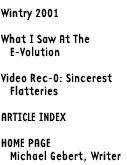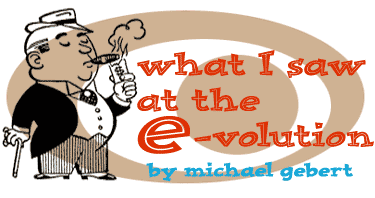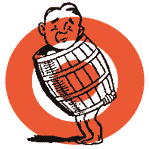


Just as there is no New Economy (e-commerce is new, but you still have to turn a profit), there may be new media and new techniques, but the Ad Biz itself never changes. Online shops, no matter how grandiose their self-images, wind up creatively downstream of the TV agency’s campaign, just like direct and promotion shops do. Your best shot at getting to do it your way remains the accounts the mainline hotshots won’t touch at all. (My best experience? A b-to-b site’s campaign, where I sold practically everything I came up with right to the marketing director and the two zillionaires who started it.)
Other old rules remain just as true. Online agencies do their worst work for themselves, too. You always work for the only agency whose PR department doesn’t know anyone at any publication, anywhere. Sites that have only existed since last April resist your ideas for clever placements or innovative media units... because they’ve always done it this way. Your reward for helping build a place from nothing... is a new CD who thinks nothing done before him was any good.

BUT HEY. YOU'VE BEEN AROUND. You knew all that. Some things that none of us knew until we discovered them the hard way five minutes ago:
Banners don’t work. Except when they do. Banners don’t work as brand-building ads an inch high. (Not when people have 54” TVs.) What they’re not good at is luring you completely away from what you’re interested in. But what they can be good at is luring you toward something similar to what you’re interested in. I did some clever banners for a modem aimed at online gamers. Astoundingly, they did very well on online gaming sites.
The other shocker is... banners work when they’re funny, smart, well-targeted. And short. And when they use cool technology like Flash or Java artfully... and when you can find a site that will accept that technology, even though they haven’t always done it that way. (You’d be amazed at the high-tech content sites that only take medieval-tech banners.) Despite the fact that banner clickthrough rates are a nanoblip above zero, I succeeded in getting double digits a few times. It wasn’t genius, but it did take some smarts—from all departments.
Online is still in the metaphor stage*—it’s like print, it’s like TV, it’s like a catalog. Online will start to achieve its true potential when somebody sells a product, from first flicker of interest to Thank You For Your Order, entirely within an interactive experience... one that seduces you as well as a TV spot, informs you as well as a catalog, and responds to your questions and needs as sensitively as a good salesperson... and yet one that isn’t really like any of those things.
Creative can help a great product, but it can’t save a bad one online. Everyone can compare everything at once; if your price is high or your service mediocre, your own customers will say so on Deja.com. In many ways advertising has never been so impotent.
Last but not least, I learned (ouch) that stock options are no substitute for cash. The only thing that is a substitute for cash is still... experience. Online, like every other specialty in our heavily siloed industry, is populated by people who’ve only ever worked in that area. Bring some wisdom from another field to e-commerce, then gather some wisdom there to take back with you, and you’ll have something way more valuable than options at 48 for a stock at 2.
* After this issue went out to my regular mailing list, I received the following reply from my first and possibly sanest creative director, the estimable Joe Norris at Sullivan Higdon & Sink:
Hey, Michael G'bart!
As always, I read your latest edition of Shameless Self-Promotion with great interest. As always, it was packed with wry commentary, pithy insight, and movies that I never even heard of, but now desperately want to see.
But unlike always, my enjoyment of your publication was interrupted by the annoying sound of my old English teacher, Mrs. Wagaman, rolling over in her grave. It happened when I read the following line:
"Online is still in the metaphor stage - it's like print, it's like TV, it's like a catalog."
Mrs. Wagaman grabbed me by the scruff of my trendy J. Crew boatneck sweater and spat, "Tell that little shit those are similes, not metaphors."
"Yes, Mrs. Wagaman."
"Don't you remember the example from that ancient poem? The line that contains both simile and metaphor? The one I tirelessly drummed into your thick little skull back in sixth grade?"
"Yes, Mrs. Wagaman."
"Then recite it again for the class, right now. No, STAND UP and recite it. And spit out that gum first."
"'His eyes were hollows of madness. His hair, like moldy hay.'"
"Good. Now which one is the metaphor?"
"The 'hollows of madness' thing."
"Correct. So what does that make 'like moldy hay'?"
"That makes it a simile, Mrs. Wagaman."
"That's right. Now get out your paste and scissors and put on your art smocks, everyone. Today we're making collages of the natural resources of the state of Alabama."